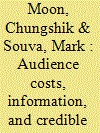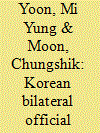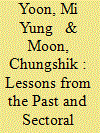|
|
|
Sort Order |
|
|
|
Items / Page
|
|
|
|
|
|
|
| Srl | Item |
| 1 |
ID:
144798


|
|
|
|
|
| Summary/Abstract |
Leaders who can accumulate audience costs can send costly signals that may help alleviate information problems associated with crisis escalation. We argue that research examining the effect of audience costs fails to appreciate the theoretical context in which audience costs matter. Audience costs may help alleviate information problems associated with international conflict. However, credible commitment problems are more central than information problems for some international conflicts. Theory does not expect audience costs to matter in this context; as a result, extant tests, and many criticisms, of the effect of audience costs on crisis escalation are flawed. We offer a more appropriate test of the effect of audience costs on crisis escalation. Consistent with extant theoretical arguments, we find that audience costs only reduce the likelihood of conflict when credible commitment problems are not the dominant concern motivating a dispute or crisis.
|
|
|
|
|
|
|
|
|
|
|
|
|
|
|
|
| 2 |
ID:
139534


|
|
|
|
|
| Summary/Abstract |
Why do some autocratic governments do better than others in attracting foreign direct investment (FDI)? The received wisdom holds that democracies enjoy advantages over autocracies when it comes to attracting FDI. But there exist autocratic countries that attract substantial amounts of FDI. For example, during the last two decades, about half of the top 20 non-OECD host countries are nondemocratic. Focusing on the role of commitment institutions by which host countries can commit their protection of foreign assets, I argue that autocrats with long time horizons can provide stronger institutions to protect property rights. This allows them to attract more FDI. Using an error correction model (EDM) covering autocratic countries from 1970 to 2008, I find evidence that strongly supports my argument. These findings suggest that what matters to foreign investors is not regime type per se but specific institutional features of the host country. Insofar as host countries provide sound institutions to protect foreign assets, they would be able to attract more foreign investment.
|
|
|
|
|
|
|
|
|
|
|
|
|
|
|
|
| 3 |
ID:
160727


|
|
|
|
|
| Summary/Abstract |
Are countries concerned about the impact on interstate commerce of security externalities? Trade often makes countries vulnerable to the vagaries of the international market and shifts the power relationship between partner countries. The volume of trade, however, has increased enormously over time. We examine how interstate rivalry affects interstate trade. An extensive literature examines the role of interstate security in shaping interstate commerce but pays little attention to that of rivalry. Similarly, the thriving rivalry literature has yet to explore the role of rivalry in non-security interstate relations such as trade. We aim to fill this gap. We argue that rivalry deters trade activities, and that this tendency is intensified amid deeper and more competitive rivalry. Using a global sample from 1949 to 2000, we find that rival dyads trade less than others, and that the negative impact of this on equal-power dyads is greater than that for unequal-power pairs.
|
|
|
|
|
|
|
|
|
|
|
|
|
|
|
|
| 4 |
ID:
132740


|
|
|
|
|
| Publication |
2014.
|
| Summary/Abstract |
In the past several years, the Republic of Korea-a former least developed country (LDC) and aid recipient that became a donor-joined the "club of emerging donors" to Africa. In March 2006, President Roh Moohyun declared Korea's Initiative for Africa's Development. The initiative puts poverty reduction and socioeconomic development of African countries in the forefront. Using pooled cross-sectional time series data, in this study we examine the determinants of Korean bilateral official development assistance (ODA) to Africa for the period 1991-2011. The findings of the study suggest that the approach of Korean ODA does not differ significantly from that of many conventional donors whose ODA disbursement has had a dual purpose: to improve the welfare of developing countries and to serve self-interests.
|
|
|
|
|
|
|
|
|
|
|
|
|
|
|
|
| 5 |
ID:
185980


|
|
|
|
|
| Summary/Abstract |
As a donor, the Republic of Korea emphasizes five sectors as primary targets for official development assistance—education, health, governance, agriculture, and industry and energy—which contributed to its own rapid economic growth; that is, the country uses its own development experience as a development assistance model. This study examines the determinants of Korean ODA allocation for each of these sectors. We hypothesize that Korea is likely to allocate more targeted ODA to countries with less achievement in these sectors, and that this tendency is stronger for low-income countries. Using disaggregated Korean ODA allocation data for 2006 to 2015, we find that while the income of recipient countries generally has a significant effect on the allocation of ODA to each sector, the level of development of that particular sector does not appear to have systematic effects on allocations. This null finding may be due to the lack of coordination among the country’s many ODA institutions and the alignment of ODA with the demands and preferences of the recipient countries.
|
|
|
|
|
|
|
|
|
|
|
|
|
|
|
|
|
|
|
|
|